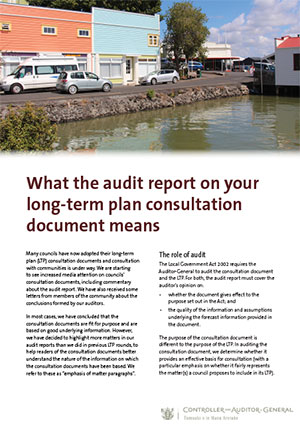What the audit report on your long-term plan consultation document means
Many councils have now adopted their long-term plan (LTP) consultation documents and consultation with communities is under way. We are starting to see increased media attention on councils’ consultation documents, including commentary about the audit report. We have also received some letters from members of the community about the conclusions formed by our auditors.
In most cases, we have concluded that the consultation documents are fit for purpose and are based on good underlying information. However, we have decided to highlight more matters in our audit reports than we did in previous LTP rounds, to help readers of the consultation documents better understand the nature of the information on which the consultation documents have been based. We refer to these as “emphasis of matter paragraphs”.
The role of audit
The Local Government Act 2002 requires the Auditor-General to audit the consultation document and the LTP. For both, the audit report must cover the auditor’s opinion on:
- whether the document gives effect to the purpose set out in the Act; and
- the quality of the information and assumptions underlying the forecast information provided in the document.
The purpose of the consultation document is different to the purpose of the LTP. In auditing the consultation document, we determine whether it provides an effective basis for consultation (with a particular emphasis on whether it fairly represents the matter(s) a council proposes to include in its LTP).
In auditing the LTP, we determine whether it provides for long-term, integrated decision-making and co-ordination of the council’s resources, and a basis for accountability of the local authority to the community. Our audits add credibility to the published information.
The audit reports we have issued on consultation documents
To date, three councils have received a qualified audit opinion. All three councils used an assumption that the auditor did not consider to be reasonable and supportable to prepare its underlying forecast information.
In each case, the auditor considered the assumption to be material and could make a significant difference to the readers’ understanding of the information proposed to be included in the LTP.
As noted above, auditors have included more emphasis of matter paragraphs in councils’ audit reports in this LTP round. The inclusion of an emphasis of matter paragraph doesn’t mean that the auditor has found anything wrong. The auditor simply wants to draw the readers’ attention to something that’s important.
We have previously described an emphasis-of-matter paragraph as the auditor’s way of calling out “Hey, reader! Make sure you take a note of this.”
For every territorial local authority, the auditor has included an emphasis of matter paragraph in the audit report to draw readers’ attention to the council’s own disclosures about the proposed three waters reform.
Although councils have prepared their consultation document as if these services will continue to be provided by the council, future decisions might result in significant changes. However, because no decisions have yet been made, councils simply don’t have the information available to present anything but the status quo.
A number of emphasis of matter paragraphs have also drawn readers’ attention to the delivery of capital expenditure programmes. For those, the auditor has gained assurance that the council’s forecast programme can reasonably be delivered. However, there is still a high degree of uncertainty because of matters like the availability of contractors and suppliers, and what other councils and organisations might be planning.
The audit report on a council’s consultation document might include other emphasis of matter paragraphs for other reasons.
Remember, if a member of your community or the media raises questions about an emphasis of matter paragraph in the audit report for your council’s consultation document, you can be confident that this is not due to the auditor finding anything wrong. It is the auditor’s mechanism for drawing attention to some of the significant challenges that your council faces.

